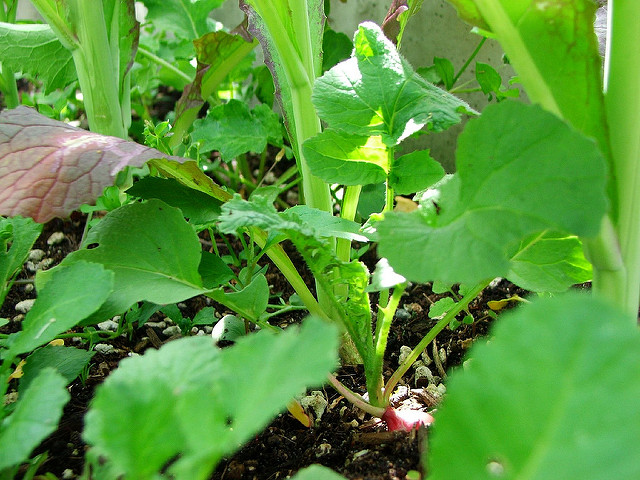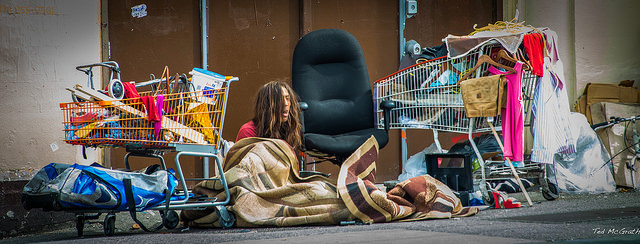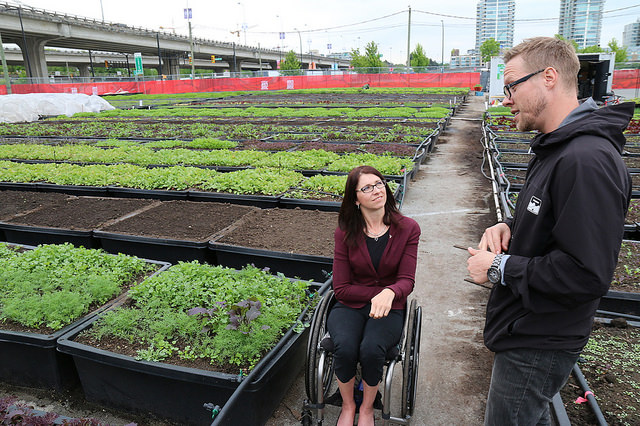
FARM IN THE CITY
Japanese farmer-philosopher Masanobu Fukuoda once said, “The ultimate goal of farming is not the growing of crops, but the cultivation of human beings.“
THE SEED IS PLANTED

The name is an acronym. It arose out of a project, “Saving Our Living Environment” (SOLE), by United We Can, a Vancouver non-profit that operates a recycling program and employs street people and people from the neighborhood to clean up streets and alleys.
Until the farms were able to operate independently, they sheltered under the United We Can umbrella.
The project was spearheaded by visionary farmer and food-growing advocate, Michael Ableman (of Foxglove Farm fame), and his collaborator Seann Dory who worked for United We Can.
They put together a project that provides stable jobs and training and development for 25 people, most of whom live in the neighborhood where they work. Together they have built an oasis of green in the middle of gray and black city hardscape.
DOWN ON THE FARM
This 2013 video, “The Story of Sole Food,” which was produced by Point Blank Creative with the support of Vancity and is available on YouTube, tells the tale:
The farms have succeeded beyond the two founders’ wildest hopes when they began reclaiming their first piece of ground in the parking lot of the Astoria hotel in Strathcona, the oldest neighborhood in Vancouver (right next door to Downtown Eastside, the poorest postal code in all of Canada.)
- Every year the farms produce over 25 tons of fresh produce that includes tree fruit from a large urban orchard that grows in an abandoned railway yard.
- The farms supply more than 30 area restaurants and sell at five Vancouver farmer’s markets. They operate a community-supported agriculture program as well.
- They donate up to $20,000 work of produce every year to community kitchens.
- Most importantly, they help their urban neighbors reconnect and re-ground themselves in the age-old cycles of life and growing that every farm honors and celebrates.
After the farm project had been going for several years, the MBA program at Queen’s University conducted research into the uber-local farming enterprise.
The guys in the lab coats figured out that for every dollar SOLE Foods spent on employing people who are “hard to employ,” there was a $1.70 combined savings to the person and the legal system, the health care system, the social assistance networks, and the environment through carbon sequestration and energy and transportation benefits. A good return-on-investment, that.

A TRADITION RE-ITERATED
In his book, STREET FARM: Growing Food, Jobs, and Hope on the Urban Frontier, Ableman details how the dream came together.
The book is a triumphant mash-up of Ableman’s philosophy about farming as a business and a traditional craft with pictures on every page spread (many of them taken by Ableman) documenting the continuing trials and tribulations of trying to build a real farm in the middle of the big city. The best parts of the book are the stories about the relationships that have developed between the organizers, the farm workers, their clients, and the Downtown Eastside neighborhoods where they work and live.
If you’d like more information about SOLE Food Street Farms, CLICK HERE.
At the time it began, the scale of the farms was, perhaps, unique. It was urban agriculture, growing food on a for-real farm that was run as a business with a heavy dose of social consciousness added in.
Many of the earlier efforts by assorted city planners and developers in various cities around the world focused on garden-scale projects – urban horticulture rather than agriculture.
It isn’t a new concept, this growing food in the middle of a city. As cities grew, the food needed to feed the people was grown all around them. Sumerians, back in 5000 BCE, were famous for the sophisticated irrigated agriculture in and around some of the world’ earliest cities in what is now southern Iraq.
But, these ancient farmers and all of their descendants in the long history of agriculture did not have farms built on top of pavement covering over the contaminated soil between buildings in the remains of demolished factories and other urban ruins.
This is what makes these street farms so remarkable. What makes them even more remarkable are the number of lives they have touched and the ones they have helped to nurture, heal and rebuild.
Michael Abelman says that SOLE Food Street Farms is “based on the belief that the simple act of planting a seed can bring new life to the world.”
[Amen to that one, braddah.]

Another IPS (Inner Peace Symptom): a tendency to build bridges between your world and other people’s worlds. [Foot-traffic on all the bridges you build brings many treasures into your world.]
Here’s a poem:
YOUNG TREE
Young tree in the ground
Started as a seed
Buried in the dark, rich,
Warm earth.
Slowly it split apart,
Shoot seeking the light,
Pushing against the cradling earth,
Slowly, slowly.
It reaches up into the light,
Day by day by day….
By Netta Kanoho
Header photo credit: “The Hidden Radish” by Steph L via Flickr [CC BY-NC-ND 2.0]
……
SOME OTHER POSTS TO EXPLORE
(Click on each of the post titles below and see where it takes you….)
……
Thanks for your visit. I’d appreciate it if you’d drop a comment or note below and tell me your thoughts.
14 thoughts on “FARM IN THE CITY”
I wonder if they’ve taken into consideration food that gets thrown out because it is not pretty enough to make it to the shelves of groceries. I can’t remember the company leading the way in that approach but together it can really help with feeding the hungry. I do like the idea of getting those without jobs a means to support themselves and eat. The growing season in Vancouver has to be rather short. Have greenhouses been considered? What do you in the winter?
Hey E Thick:
Thanks for your visit and your thoughts.
Food that is not “pretty” enough for regular marketing is distributed by SOLE Street Farms to the neighbors and to food kitchens and such.
The thing is, the farm IS a business. They have to balance helping their neighbors with supporting themselves so that they can continue to employ their workers and provide stable jobs. While they do receive help from assorted investors and others, they still have to maintain good business practices. They do what they can to help the community around them.
The farms use bio-intensive farming practices and take advantage of the growing season as they can to produce as much food as they can, but the cost of constructing and maintaining full-blown greenhouses with the heating and so on and so forth are prohibitive. They do keep working on it.
Thanks for your interest.
Please come again….
This is such a great way to offer food and work to people that most people would just ignore. It sounds like a wonderful project that provides so much good in a world that produces so much waste.
I love the fact that it is a real farm in an urban setting doing good for society as a whole. You don’t see enough people willing and able to support a cause like this.
Thank you for showcasing this great organization and what they do. It’s very inspiring!
Thanks for your visit and your comment, Jen. I do appreciate it.
Please do come again.
Netta,
Sharing this “Farm in the City” is a huge advantage for others to actually embark on doing the same in other cities that need this type of program. Many cities in the United States are overcrowded with people who have come to this country from elsewhere looking for a better life only to be living on the streets and in poverty. Placing farms in places like this for them to grow their own foods or have farmers markets to help them make a living from work they have done is an excellent idea. I am hoping the right amount of people see this article and do this in places where it could be very helpful and useful.
Thank you,
Susan
Thanks for your visit and for sharing your thoughts, Susan. I do appreciate it.
Please do come again.
This sounds amazing. I have never heard of Sole foods before but I truly admire the work they are doing and the fact that they are giving back to the community. I think it is a brilliant idea to have a farm in the city both as a way of supporting the community but also as a way of sharing and giving back.
I really like how you have incorporated history with today and like you are mentioning this is not a new thing to have farms in the city but we seem to have forgotten how important it can be.
Do you think city farms are something that will spread? Do you know if they have them in more places across the world?
Thanks for the visit and for sharing your thoughts, Alexandra. Wikipedia has an “urban agriculture” entry that’s mind-blowing. They list different efforts from around the world. Apparently this is a global effort.
It really does make sense. People need food and what better way to get food than by growing it your own self?
Please do come again.
Taking part in this type of community program is a marvelous step for both economic and agricultural growth. This is by far one of the most astonishing ideas to produce vegetable product in the midst of a bustling city.
I wish that this advocacy can also reach on different parts of the world. The possibility of local produce abundance can help save a lot problems, most especially hunger. This is what my country needs right now.
Some people in our government would shamelessly take agricultural lands into subdivisions for their own profit, leaving a great blow in food source and development.
Thanks for sharing. I hope to read more and see if this advocacy can also work in our country. I know everything is hard in the beginning but we all want great results in the end. Thanks for sharing!
Thanks for the visit and for sharing your thoughts. I think urban farming is seeing a revival around the world.
Wikipedia says Cuba and Egypt have had successful urban farming projects since the 1990s. In the earlier part of this century, China has had several programs including one in Beijing and another in Dongguan, Guangdong, as has Thailand.
I know that many cities in the United States, Canada and the UK have also started programs and Australia has made a lot of progress too. I cannot imagine the creative peoples in other countries are not also looking at this way to feed themselves.
I find it all very exciting. (I LIKE food and eating, me.)
Please do come again.
Wow!! I must say you going into a program that involves a community is really nice as it would have major changes in the agricultural and economies aspects.
Thanks for sharing this awesome article. I know it would be of great help to the public as it has been of help to me.
Thanks for the visit and for sharing your thoughts, Ismeglamour. I do appreciate it and I’m glad the post was helpful to you.
Please do come again.
Netta,
You hit home with me and this article. My mom had a garden when I was a kid, she taught us so much about growing our own food. Now being an adult and a parent, I wish I was able to teach my daughter about gardening and the rewards of it. Yes it is hard work, but the beauty of a garden and the rewards from them are totally worth every bit of the work.
We currently live in a desert metropolitan area and having something like the SOLE Food Street Farm would be so wonderful. Do you happen to know if there is anything in the Mesa or Phoenix area?
This could be such a wonderful addition to every city across the US, and the paying jobs it provided for the homeless and unemployed community members was a great benefit. It should be a nation wide goal.
Thank you for this article, I hope more people who care about their community and the food they eat come across this article. I intend to share it for sure!
Stacie
Stacie, I’m glad you found my post about the street farm in one of Vancouver’s worst troubled neighborhoods interesting. I know there are all kinds of urban-centered farming attempts and organizations in many American cities. Many of them are inspired by Michael Abelman’s work in Vancouver but I have no idea how successful they’ve been.
I do agree that more of these organizations sure would be a blessing.
Please do come again….